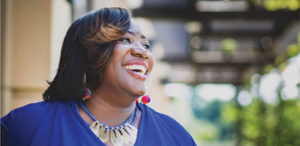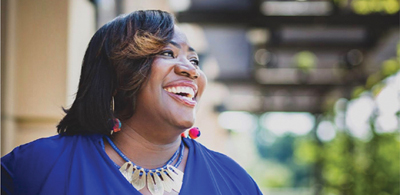
(RNS) — When white supremacist Dylann Roof gunned down nine Black Christians at Emanuel A.M.E. Church in Charleston, South Carolina, on Jun. 17, 2015, Latasha Morrison said her predominantly white church “didn’t even know how to handle it.”
No one, she said, seemed to notice. “That day I came to church and people were carrying on like it was a normal day. I was devastated,” she said.
This was a church where a fellow member had decided during a staff meeting to explain to Morrison “what Lincoln did to the South and that people loved their slaves.”
That did not go over well, Morrison said.
“I actually wanted to become the Incredible Hulk and knock over the table,” she said.
That conversation stuck with Morrison. She wondered how people who shared the same faith could have such different views. And she wondered if church members from different backgrounds could ever really talk about race.
“We’ve grown up in two different worlds, two different Americas. I think that was the beginning,” Morrison said. “It took me three days to process that conversation. If she’s thinking this, that means a whole lot more people are having these same thoughts. If I’m going to be in this environment, then I want to help re-shape perspectives in worldviews and change lenses and really bring truth in those spaces.”
That experience led Morrison to found Be the Bridge, a faith-based nonprofit that provides a framework for meaningful cross-cultural relationships and dialogue about America’s racial history.
When it launched in 2015, Be the Bridge’s Facebook group had about 69 members. Today, the online community fostering racial reconciliation is more than 21,000-strong, with more than 1,000 groups in 48 states.
The nonprofit was tapped in September to receive up to $1 million in grants by Facebook’s inaugural Community Leadership Program, which also awarded Morrison and four other global leaders a residency.
Morrison, a certified diversity trainer who converted to Christianity in college, worked at several churches and similar organizations after transitioning out of a career in IT and earning her MBA at Liberty University. The 45-year-old North Carolina native grew up in a military family and was raised in diverse communities.
But when she left Atlanta to work at a church in Austin, Tex., she said she began to feel out of place.
Morrison said she had a hard time finding Black friends. And her white friends had a hard time talking about issues related to race. That was true in her personal life and in the church.
She describes Be the Bridge as a ministry and the organization’s successes as guided by God. Yet, when she presented Be the Bridge at a Facebook summit, Morrison was unsure if she should identify it as a faith-based organization.
“But they (Facebook) really wanted me to name it,” she said. “I thought that was just incredible, that they wanted me to name it.”
She said that the consultant Facebook had her work with at the time encouraged her to bring her “full self” to the table.
“That impacted me, that there’s an organization that doesn’t claim that they’re a Christian organization or anything like that, but they wanted me to bring my full self when there are
Christian organizations and churches that I cannot step in and be my full self. I thought that was incredible,” Morrison said.
According to Facebook, Morrison and her fellow residents have “demonstrated the ability to transform the way people support each other through community.”
Be the Bridge creates curricula to educate, stir respectful discussion, and inspire interracial and cross-cultural relationships in offline groups. Scripture reading and prayer are also integral parts of group meetings, aimed at helping members develop a common language about race.
For example, the “Whiteness 101” foundation course aimed at white “bridge builders” covers such topics as “developing a white identity” and “overcoming white fragility.”
Be the Bridge’s local impact was highlighted in a Baltimore Sun podcast about how two men, one Black and the other white, overcame their racially rooted fears through co-leading one of the offline groups.
Gina Fimbel of Wilmington, N.C., first heard about Be the Bridge when she heard Morrison speak at a conference.
“The shootings of Tamir Rice, Michael Brown and Trayvon Martin had happened, and I was painfully aware that, as a white American, I had work to do,” said Fimbel. “I didn’t know exactly how to begin or what to do, and that is when God put Tasha in my life.”
Lauren Brown, who leads the South Jersey Be the Bridge group, said that her faith motivated her to become involved in reconciliation. That starts with being honest about the racial divides in the country, she said.
“Tasha has a clear understanding that we can’t heal what we don’t acknowledge and that the only way to heart transformation and bridge building starts with truth and is delivered with grace,” she said.
Morrison plans to use the Facebook Community Leadership Program funding to develop curricula for college-age and high school students, as well as expand Be the Bridge’s internal resources and global reach. She also has a book due out entitled, “Be the Bridge: Moving Toward Racial Reconciliation.”
Racial reconciliation has become a controversial topic in evangelical churches, like the ones that Morrison has belonged to. Some Black Christians have decided to leave white churches and focus on being part of predominantly Black congregations. Others have criticized seminaries and Christian conferences for their lack of diversity.
Morrison says she feels called to remain in a mostly white congregation.
“I think that’s my story and that’s the space that I’ve been in the last 10 years. And that’s the space that needs this work,” she said.

